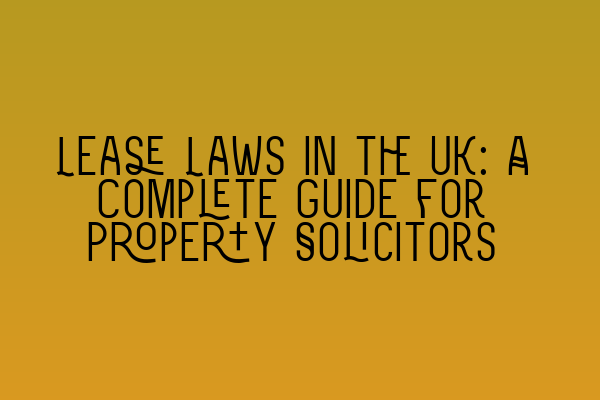Lease Laws in the UK: A Complete Guide for Property Solicitors
As a property solicitor, it is essential to have a comprehensive understanding of lease laws in the UK. The lease agreement is a crucial document that governs the legal relationship between landlords and tenants. Whether you are dealing with residential or commercial leases, having a solid grasp of the relevant laws and regulations is vital to providing effective legal advice to your clients. In this guide, we will discuss the key aspects of lease laws in the UK that every property solicitor should be familiar with.
Understanding Lease Agreements
Before delving into the specific lease laws in the UK, it is important to have a clear understanding of what a lease agreement entails. A lease agreement is a legally binding contract between a landlord (the property owner) and a tenant (the person or entity renting the property). It outlines the rights and obligations of both parties during the tenancy period.
Lease agreements typically include details such as the duration of the tenancy, the amount of rent, the responsibilities of the landlord and tenant, and any additional terms and conditions agreed upon by both parties. These agreements may also cover issues such as repairs, maintenance, and termination of the lease.
The Landlord and Tenant Act 1985
The Landlord and Tenant Act 1985 is a fundamental piece of legislation that governs lease laws in the UK. It provides important protections for both landlords and tenants and sets out their respective rights and responsibilities.
Under the Act, landlords are required to provide their tenants with certain information, such as their name and address, at the start of the tenancy. It also prohibits landlords from imposing unfair terms on tenants and sets out procedures for the protection of tenants’ deposits.
Furthermore, the Landlord and Tenant Act 1985 contains provisions relating to the repair and maintenance of rented properties. Landlords have a legal obligation to keep the property in a good state of repair and ensure that it meets minimum standards for health and safety.
The Housing Act 1988
Another key piece of legislation that property solicitors should be familiar with is the Housing Act 1988. This Act introduced the Assured Shorthold Tenancy (AST), which is the most common type of tenancy in the private rental sector in the UK.
Under the Housing Act 1988, an AST provides tenants with certain rights, including security of tenure for the fixed term of the tenancy. It also sets out the procedures for serving notices to terminate a tenancy and the circumstances in which landlords can regain possession of their property.
It is important for property solicitors to understand the intricacies of the Housing Act 1988 to ensure compliance with its provisions and to advise their clients accordingly.
Lease Extension and Enfranchisement
Lease extension and enfranchisement are significant areas of lease law that property solicitors frequently deal with. Lease extension allows tenants to extend the term of their lease, while enfranchisement provides tenants with the opportunity to purchase the freehold of their property.
The Leasehold Reform, Housing, and Urban Development Act 1993 introduced important rights for tenants to extend their leases or acquire the freehold of their property. This legislation sets out the eligibility criteria, the procedures to be followed, and the valuation methods for determining the premium payable for lease extension or enfranchisement.
Understanding the complexities of lease extension and enfranchisement is crucial for property solicitors to effectively advise their clients on their rights and guide them through the process.
Conclusion
Lease laws in the UK are complex and multifaceted, requiring property solicitors to have a comprehensive understanding of the relevant legislation and regulations. The Landlord and Tenant Act 1985 and the Housing Act 1988 form the cornerstone of lease laws in the UK, providing crucial protections for both landlords and tenants.
Furthermore, lease extension and enfranchisement are significant areas of lease law that property solicitors must navigate proficiently. Having a deep understanding of these processes enables solicitors to provide valuable advice to their clients and help them achieve their desired outcomes.
As a property solicitor, staying informed about any updates and developments in lease laws is essential. By keeping up with changes in legislation and case law, you can ensure that you provide accurate and up-to-date advice to your clients.
If you would like to learn more about lease laws and other relevant topics, check out our related articles:
